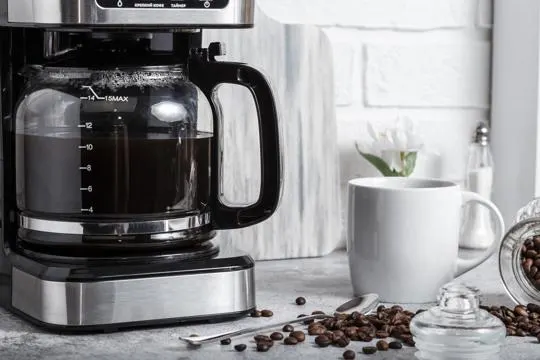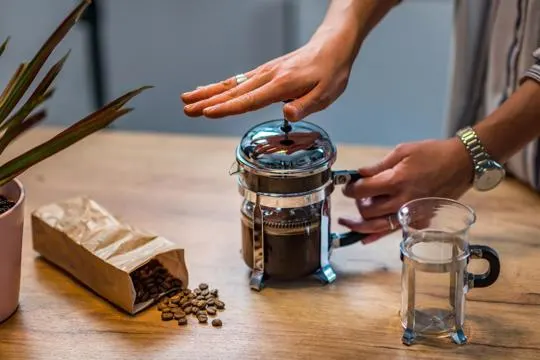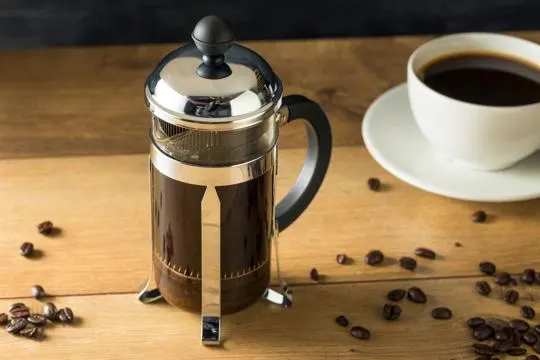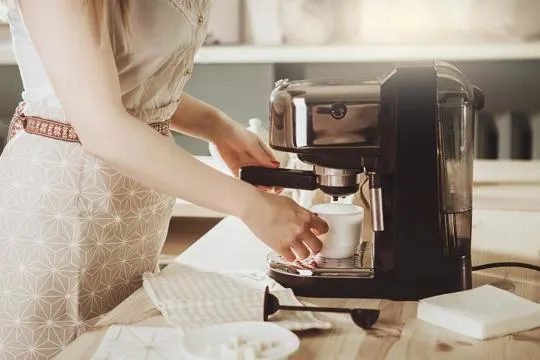Ah, the age-old debate that gets coffee aficionados buzzing more than a double espresso: Coffee Maker vs French Press.
We’ve all been there, bleary-eyed in the morning, craving that perfect cup of joe. What’s the brew method to rule them all? You might think it’s all just coffee. Not quite.
Coffee makers are the go-to for convenience. Hit a button, and bam, coffee’s ready. French presses, on the other hand, ask for a bit more love and a touch of patience.
We remember our first French press experience. It was a game of trial and error. Coffee too strong, then too weak. But the victory sip? Unbeatable.
And those mornings needing a quick fix? Our coffee maker was our best friend.
Each team plays a crucial role in our caffeine-fueled lives.
What is a Coffee Maker?

A coffee maker is a device designed to brew coffee automatically – simplifying the process.
With one button, you can enjoy freshly brewed coffee quickly. The main perk? Convenience.
No manual measuring of the grounds or worrying about water temperature and brewing time.
Certain advanced models offer programmable features to preset your desired strength and schedule.
Plus, coffee makers are versatile.
Most models provide different brewing options like single cup, carafe, or espresso shots – perfect for personalizing your coffee experience or catering to others’ tastes.
With different sizes and designs, they suit all kitchen spaces and styles.
What’s more, some include bonus functionalities such as built-in grinders for grinding fresh beans or frothers for creamy foam.
In short, a coffee maker is ideal for any coffee lover who cherishes convenience, customization, and efficiency in their morning routine.
It delivers an enjoyable cup of coffee with the press of a button while saving your time and energy.
What is a French Press?

A French press is a special device for making coffee.
It has a cylindrical container, a plunger, and a mesh filter.
To use it, you need coarsely-ground coffee and hot water.
Leave it to steep for some time. Then, press down the plunger.
This separates the brewed coffee from the grounds.
So, you get a richer, fuller cup of coffee that has more oils and flavors than other brewing methods.
Coffee lovers like it as it gives them control over their perfect cup of joe.
If you want a change from your regular drip machine or espresso maker, why not try a French press?
Comparison of Coffee Maker and French Press

A coffee maker and a French press are two popular ways to make coffee.
They have the same purpose, but vary in many ways.
Brewing Process
Coffee maker and French press have different ways of brewing.
Coffee maker uses water to get the flavor from the ground coffee.
For French press, you mix hot water and coffee grounds to steep them.
The drip system is used for coffee maker while French press uses immersion brewing.
This changes the taste and quality of the coffee.
Plus, coffee maker is great for busy people as it is efficient.
French press gives a more traditional, full-bodied flavor that appeals to coffee lovers.
Brewing Time
Brewing time can be a deciding factor between using a coffee maker or a French press.
Both make yummy coffee, but the timing differs greatly.
Coffee makers usually take several minutes.
The machine heats the water to the right temp and passes it through the grounds, quickly extracting flavor and aroma.
This hands-off approach is consistent and saves time.
On the other hand, a French press takes more time, but gives a more involved experience.
You add coarsely ground coffee and hot water, steeping for a few minutes, then pressing down the plunger to separate liquid and grounds.
This manual process offers control over the time and strength of flavor.
Some coffee fans believe longer brewing times give a richer flavor.
With a French press, you can adjust the time to get your desired taste.
In conclusion, coffee makers are faster but French presses let you customize and explore.
Both have unique advantages to fit preferences and needs.
Control over Strength and Flavor
Control of your coffee’s strength and flavor is key to a personalized brewing experience.
The coffee maker and French press both offer this, but in different ways.
A coffee maker lets you adjust strength with the coffee-to-water ratio.
You can make it stronger or milder according to your preference.
Some coffee makers also have options for setting brew time and temperature.
The French press gives you control over factors like water temp, steeping and stirring.
You can tailor the flavor profile to your liking.
The French press extracts oils from the grounds more efficiently.
This enhances aroma and body, and gives a full-bodied cup.
Its filter is coarser than a paper filter.
This allows sediments and oils to pass through, giving it a unique taste that coffee-lovers appreciate.
Ease of Use and Convenience
When it comes to ease of use and convenience, coffee makers and French presses can be quite different.
With a coffee maker, you just fill the machine with water and ground coffee, press a button and you’re done.
But, with a French press, you have to measure and grind beans, bring water to the right temp, add grounds, steep for a few minutes, and then press down on the plunger.
Many coffee lovers enjoy this process.
But, some prefer the ease of using a coffee maker.
It’s programmed start times and multiple cups make it convenient.
Plus, most come with auto shut-off features.
French presses offer a more hands-on experience.
You can control water temp and steeping time, which can influence flavor.
Some say it brings out more nuanced flavors than with a machine.
Which method is better? It all comes down to personal preference.
How do you like to savor your daily caffeine?
Similarities Between Coffee Maker and French Press

Coffee makers and French presses are two popular ways to make coffee.
Both allow hot water to pass through coffee grounds to make a strong, flavorful cup.
Using coffee grounds is similar in both methods.
With a traditional drip maker, the grounds are filtered.
In the press, they are added directly. Both methods involve steeping.
The French press needs coarse grounds to be steeped in hot water, then pressed down.
A coffee maker uses a filter or paper cartridge to hold the grounds while water passes over.
You can control variables like brew strength and serving size with both.
You can adjust the amount of coffee used or change the grind size.
This way, you can experiment and create a custom cup.
However, there are distinguishing features.
French presses can capture more natural oils in the coffee beans.
This can make the cup fuller and more flavorful than what a standard drip machine would make.
Factors to Consider When Choosing between a Coffee Maker and a French Press
When selecting between a coffee maker and French press, various factors come into play.
Consider the brewing method: drip for coffee makers; immersion for French presses.
This affects the flavor and strength.
For convenience, coffee makers offer automation, timers, and freshly brewed coffee.
French presses require manual effort but provide more control.
Your coffee preference matters, too.
Coffee makers produce smoother, less oily coffee; French presses make bold, full-bodied brews with sediment.
Durability is an aspect, too.
Coffee makers are typically durable; French presses are sturdy but can break if mishandled.
Cleaning is part of the equation.
Coffee makers have removable parts that can be cleaned easily; French presses take more time and effort.
Lastly, budget considerations weigh in.
Coffee makers vary in cost; French presses are more affordable upfront but require replacing filters.
Weigh these factors to make an informed decision between a coffee maker and a French press.
Cost
Cost is a big part of the decision when picking between a coffee maker and a French press.
Coffee makers are usually pricey, with prices from $50 to $300, depending on the brand and capabilities.
French presses, on the other hand, are more affordable; they cost between $20 and $50.
It’s essential to note that a coffee maker’s initial cost can be higher, since you have to buy the machine itself.
Plus, some coffee makers need special filters or pods, which increases ongoing expenses.
French presses cost less upfront and there are no extra accessories or disposable items.
Also, their basic design makes maintenance less costly.
In the end, it comes down to personal choice and budget.
Whether you get a coffee maker or a French press, it is important to consider the initial cost, long-term savings, and which option works best for you.
Brewing Quantity
Brewing quantity varies between a coffee maker and French press.
Coffee makers are good for larger amounts, like multiple cups.
French presses are better for more intimate, smaller amounts.
Certain coffee makers offer single cup brewing too, so you can choose your daily caffeine fix.
To decide which is best for your needs, it’s important to know the brewing quantity of each method.
Maintenance and Cleaning
When owning a coffee maker or French press, maintenance and cleaning are essential.
Keeping these appliances clean ensures their longevity and the quality of your coffee.
It’s crucial to not overlook the simple steps of regular maintenance.
For both the coffee maker and French press, regularly clean removable parts such as filters, filter baskets, and plungers.
Residue may build up and affect taste and aroma.
Use warm, soapy water and a soft brush for thorough cleaning.
Descaling is also important for your coffee maker.
Mineral deposits can clog the internal components, so follow the manufacturer’s instructions for descaling, using either vinegar or a commercial descaling solution.
For a French press, disassemble after each use and rinse out leftover grounds.
Wash all parts with warm soapy water, or put in the dishwasher if dishwasher-safe.
Don’t forget to store your coffee maker or French press in a dry location away from direct sunlight or moisture.
By doing these cleaning and maintenance tasks, your coffee maker or French press will stay in optimal condition for years.
Make time to care for these appliances as they provide you with that perfect cup of java every morning.
Brewing Experience and Personal Preference
Brewing experience and personal taste form the core of making coffee.
One’s decision between a coffee maker and a French press is based on these factors.
With a coffee maker, you get the comfort of automated brewing.
A French press gives you a hands-on approach and a unique taste.
Both methods let you create your own perfect cup of joe.
A coffee maker provides the convenience of pressing a button and waiting for it to do its work.
It is suitable for those who value speed and efficiency.
The machine’s precise measurements and brew settings guarantee a consistent taste, ideal for busy people who need reliability.
Using a French press offers a different brewing experience.
You steep coarsely ground coffee beans in hot water and then press down the plunger to separate the grounds from the brewed coffee.
This method gives more control over extraction time and temperature.
The lack of paper filters keeps natural oils from the beans, increasing the aroma and taste.
Your personal preference is a major factor in choosing between these two methods.
Some may appreciate the ritualistic aspect of the French press, its simplicity and connection to tradition.
Others may prioritize the speed and convenience of a coffee maker when they are in a rush.
Conclusion
The coffee maker and French press offer contrasting brewing techniques, each with its own pros.
The coffee maker offers speed and convenience, while the French press gives a richer, bolder flavor.
The coffee maker’s automated process is perfect for busy people who need coffee fast.
Just add grounds and water, press a button, and voila.
On the flip side, the French press requires more effort.
Users must add grounds, pour hot water, let it steep, then press down the plunger.
This allows better control over brewing parameters like time and temperature, resulting in a stronger, tastier brew.
Coffee makers come with settings to modify strength and size according to one’s liking.
However, the French press is more limited and usually only produces single-serve batches.
Despite this, it offers a more tailored experience to suit an individual’s taste.

Leave a comment